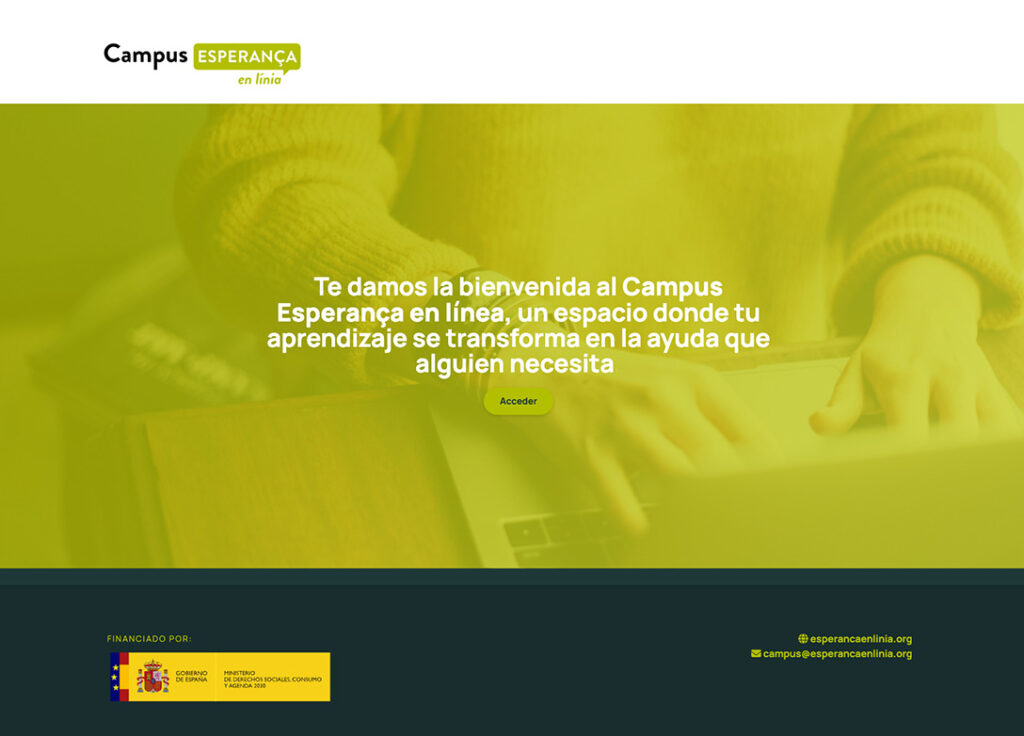Last Thursday, October 9th, and within the framework of the activities on the occasion of International Mental Health Day, the Campus Esperança Online, the online learning platform funded by the Ministry of Social Rights, Consumption and Agenda 2030 and aimed at all people who dedicate their time to volunteering linked to emotional support, grief support and suicide prevention.
The activity was held at Barcelona Social Hub and was attended by Sergi Garcia, technical director of Esperança en Línia; Cecília Borràs, president of After Suicide – Survivors Association and Núria Monsalve; technician of the Catalan Federation of Social Volunteering. During the event, Garcia referred to the value of people who, “guided by altruism and generosity, choose to dedicate their time to volunteering”. Peer support, as we know well in our organization, has the capacity to create complicity and trust with the person being assisted that, for example, healthcare or psychological interventions (which are often essential to treat certain ailments or pathologies) do not have. However, this support “must be adequate and professional” – which does not mean paid – but “of quality”.

From our entity, continued the technical director and expert in suicide prevention, who has more than half a century of experience, we want to share part of this experience with other volunteer entities that – like Esperança en Línia – work for emotional well-being. And that is why this platform is open “to all volunteers from any Spanish entity”. And the platform is born with a series of contents developed from focus groups with volunteers, “based on the needs that they themselves have expressed”.
Volunteering deserves the best tools and the best support
For her part, Cecília Borràs – who has collaborated in the development of two of the training pills ofAccompaniment in mourning i Psychological first aid – highlighted “the value of volunteering as the heart of all entities that fight for social change” which must be emphasized especially at a time like the current one, where the uncertainty and hopelessness that reign in our environment do not help to have good emotional health. Borràs especially highlighted the content dedicated to the care of volunteers – an element that was repeated during the question and answer session – where the psychologist warned about the so-called compassion fatigue, a phenomenon that can affect all those people who are routinely exposed – whether due to their work, life circumstances or volunteering. Finally, Borràs concluded that “volunteers deserve the best tools and the best support” so that they can carry out their work in an optimal and satisfactory way for both them and the person being cared for.
A relationship that must be safe and beneficial for all parties
It was precisely this link that Núria Monsalve focused on. Representing the Catalan Federation of Social Volunteering, Monsalve highlighted how continuing education but also voluntary action deserve recognition and have an impact on the professional and personal development of those who do them. Monsalve also emphasized the role that training plays in marking the limits of what the volunteer does and the functions of mental health professionals and how having these differences clear gives security to both the volunteer and the people served, making the task profitable for all those involved.
The presentation was attended by a group of students from the master's degree in emotional intelligence and well-being. University of Rosario (Colombia) – invited as part of different activities in Barcelona by volunteer Javier Montferrer, who has also participated in the development of the campus content – as well as representatives of other local entities and our volunteers.
If you want to know more about the educational content of the Campus or want to continue training in your work as a volunteer, visit the Campus Esperança Online.


